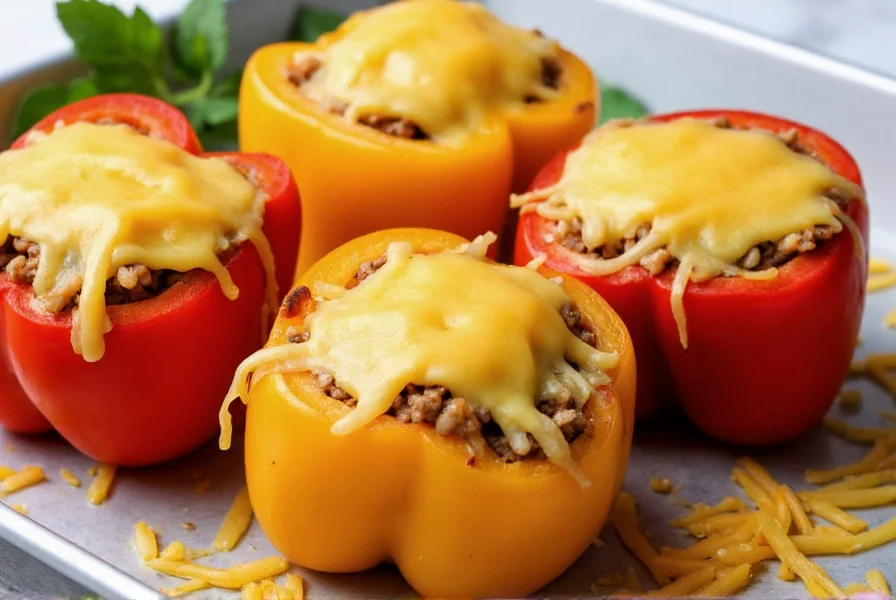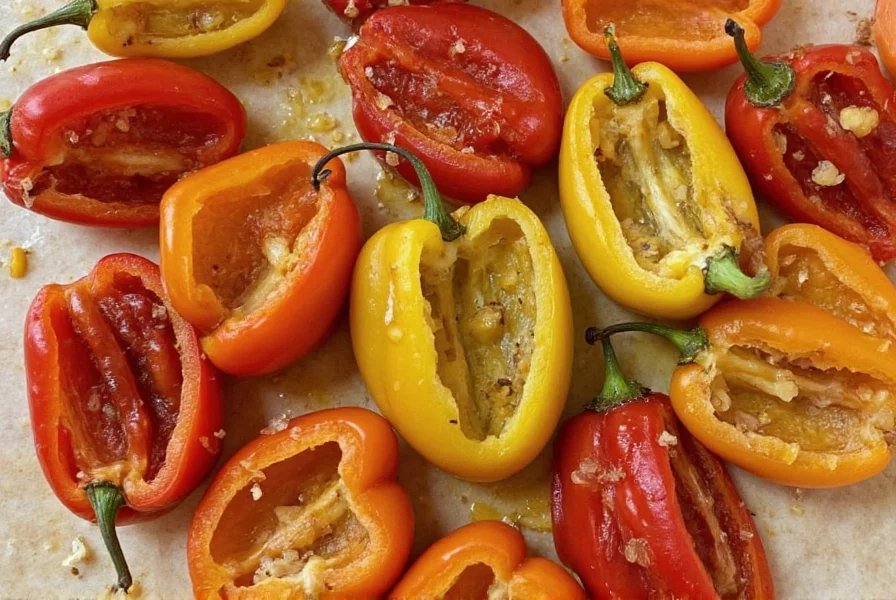The Science Behind Perfect Pepper Fillings
Creating exceptional stuffed peppers requires understanding the interplay between pepper varieties and filling components. Not all peppers respond the same way to heat and moisture, which directly impacts your final dish's texture and flavor absorption.
Bell peppers offer the classic stuffing vessel with their wide cavity and mild flavor, while poblano peppers provide a subtle heat that complements many fillings. For best results when preparing pepper filling recipes, select firm, heavy peppers with four lobes at the base - these typically have thicker walls that hold up better during cooking.
Essential Components of Quality Pepper Fillings
Every successful stuffed pepper recipe contains these critical elements:
| Component | Purpose | Common Examples |
|---|---|---|
| Base Ingredient | Provides structure and bulk | Cooked rice, quinoa, couscous, or breadcrumbs |
| Protein Source | Adds nutritional value and heartiness | Ground beef, turkey, lentils, black beans, or tofu |
| Aromatics | Builds flavor foundation | Onion, garlic, celery, bell peppers |
| Binding Agent | Prevents filling from becoming soggy | Egg, tomato paste, or additional breadcrumbs |
| Flavor Enhancers | Creates depth and complexity | Herbs, spices, cheese, citrus zest |
5 Tested Pepper Filling Recipes for Every Preference
Classic Beef and Rice Stuffed Bell Peppers
This traditional pepper filling recipe serves 4 and takes 55 minutes total. Brown 1 pound lean ground beef with 1 diced onion and 2 minced garlic cloves. Add 1 cup cooked rice, 1 (15oz) can diced tomatoes (drained), 1 teaspoon paprika, and salt to taste. Cut tops from 4 bell peppers, remove seeds, and par-boil for 5 minutes. Fill peppers, top with ½ cup shredded cheddar, and bake at 375°F for 30 minutes until peppers are tender-crisp.

Vegan Quinoa and Black Bean Poblano Peppers
For vegetarian pepper filling recipes that satisfy, roast 4 poblano peppers at 400°F for 20 minutes until blistered. Remove skins, then fill with mixture of 1 cup cooked quinoa, 1 (15oz) can black beans (rinsed), 1 cup corn, ½ cup diced tomatoes, 1 teaspoon cumin, and juice of 1 lime. Bake an additional 15 minutes. The poblano's natural sweetness complements the earthy quinoa perfectly.
Mediterranean Stuffed Peppers with Feta
Combine 1 cup cooked bulgur wheat with ½ cup crumbled feta, ¼ cup chopped Kalamata olives, 1 cup chopped spinach, 2 tablespoons chopped fresh mint, and 1 tablespoon lemon zest. Stuff into 4 pre-boiled bell peppers and bake at 375°F for 25 minutes. This healthy pepper filling alternative delivers bright Mediterranean flavors in every bite.
Cheesy Jalapeño Popper Style Stuffed Peppers
For those who enjoy cheesy stuffed pepper filling options, blend 8 oz cream cheese with ½ cup shredded Monterey Jack, 4 chopped jalapeños (seeds removed for milder version), 2 tablespoons bacon bits, and 1 clove minced garlic. Stuff into 8 halved jalapeños and bake at 350°F for 20 minutes until filling is golden. These make excellent appetizers or side dishes.
Sweet & Savory Stuffed Banana Peppers
Combine 1 pound ground turkey with ½ cup cooked wild rice, ¼ cup dried cranberries, 2 tablespoons chopped pecans, 1 tablespoon maple syrup, and 1 teaspoon sage. Stuff into 6 pre-boiled banana peppers and bake at 375°F for 25 minutes. This unexpected pepper filling recipe variation works beautifully for holiday meals.
Proven Techniques to Prevent Soggy Stuffed Peppers
Many home cooks struggle with how to make stuffed peppers not soggy. The solution lies in proper pepper preparation and filling composition:
- Par-cook peppers by boiling for 3-5 minutes or roasting at 400°F for 15 minutes before filling
- Remove excess moisture from fillings by draining cooked ingredients thoroughly
- Add binding agents like 1-2 tablespoons of breadcrumbs or an egg to absorb moisture
- Place peppers upright on a baking sheet rather than in a dish to allow steam to escape
- Finish under the broiler for 2-3 minutes to set the top layer of filling
Customizing Pepper Fillings for Dietary Needs
Adapting gluten-free stuffed pepper recipes is straightforward - simply replace breadcrumbs with gluten-free alternatives like cooked quinoa, rice, or certified gluten-free oats. For keto-friendly versions, substitute rice with cauliflower rice and increase protein content.
When creating meal prep stuffed peppers, undercook the peppers slightly and store fillings separately. Assemble just before reheating to maintain optimal texture. Properly stored in airtight containers, stuffed peppers keep for 4 days in the refrigerator or 3 months frozen.
Serving Suggestions and Storage Tips
Pair stuffed peppers with complementary sides that enhance their flavors without overwhelming them. Classic bell pepper stuffed with ground beef pairs beautifully with a simple green salad and crusty bread, while Mediterranean versions shine alongside tzatziki and roasted vegetables.
For storage, cool stuffed peppers completely before refrigerating. Reheat in a 350°F oven for 20-25 minutes rather than microwaving to preserve texture. Freezing works well for most traditional stuffed pepper recipes - wrap individual peppers tightly in plastic wrap followed by aluminum foil before placing in freezer bags.











 浙公网安备
33010002000092号
浙公网安备
33010002000092号 浙B2-20120091-4
浙B2-20120091-4